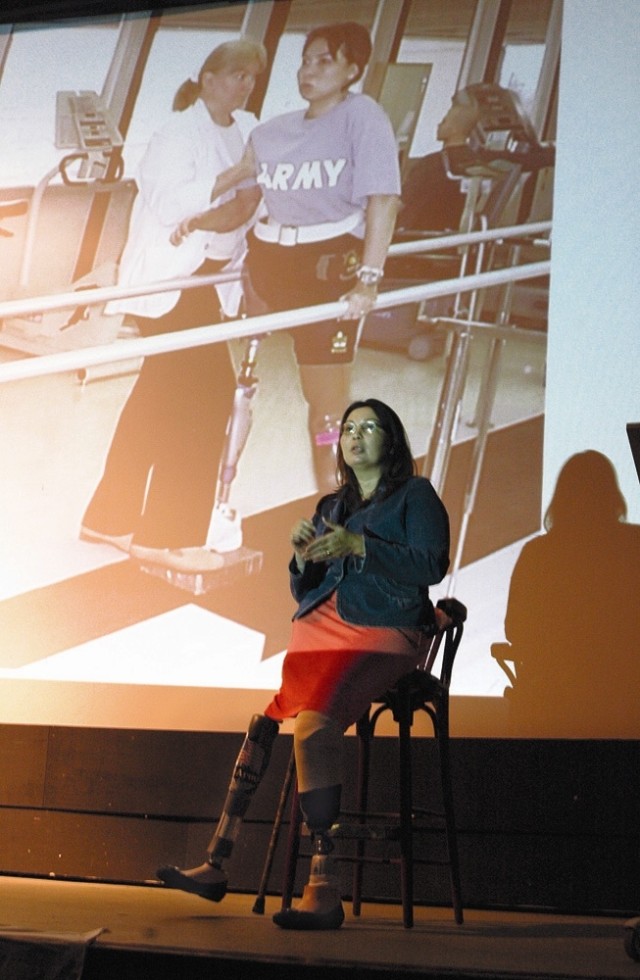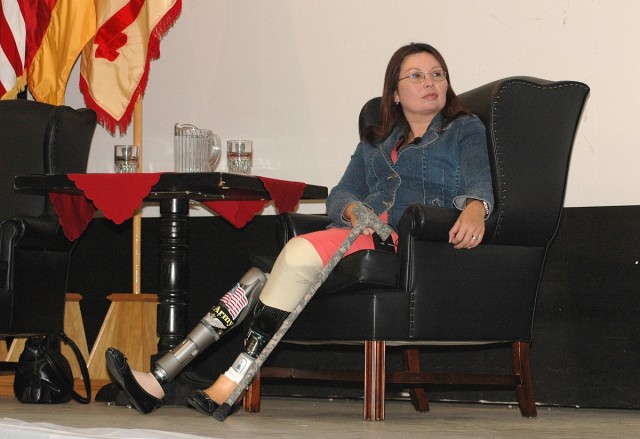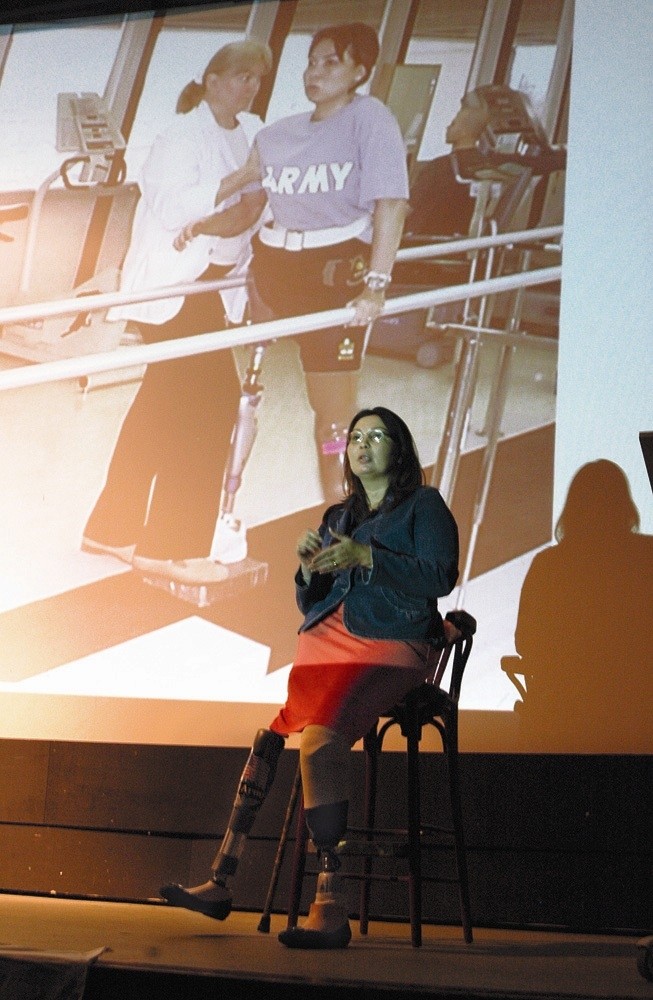HEIDELBERG, Germany - "I should have died. Having almost died, I am far more fearless."
Maj. Tammy Duckworth, an Illinois Army National Guard pilot and director of the Illinois Department of Veterans' Affairs, is as intimate with death as one can get. Three years ago, death appeared in the cockpit of her UH-60 Black Hawk.
She described her experiences, which led to the loss of both of her legs, and discussed disability awareness and the value of disabled employees to more than 100 attendees of the U.S. Army Garrison Heidelberg Disability Employment Awareness Month program at Patrick Henry Village Theater Oct. 31.
While flying in Iraq in November 2004, a rocket-propelled grenade blasted through the floor of her helicopter, taking off her right leg nearly to the hip and damaging her left leg before punching a hole in the cockpit roof.
Duckworth credits a series of events and decisions with saving her life: Her military training that kept her flying after the impact; her safety gear; a quick response by her crew; and the medical care en route to and at Walter Reed Army Medical Center.
"We basically flew up into a wall of small arms and RPG fire - everything the bad guys had was being thrown up at us," she said.
"One of the RPGs came through the port where my right leg used to be, then came this giant fireball in my lap, throwing shrapnel and fire up past my face," Duckworth said.
"I remembered back to my instructor whacking me on the back of the head with his pointer, saying 'Just because something goes wrong doesn't mean you don't stop flying.' I remember trying to shut off the engines, and then I passed out."
Duckworth later saw her pilot's ballistic face shield - completely impregnated with shrapnel - and appreciated her battalion's safety officer's insistence that, despite the uncomfortable heat, she fly in full gear to set an example. Many had ditched the equipment for comfort.
"My survival that day was due to wearing my aviation life support gear exactly the way I was supposed to," she said. "Otherwise I would have had my face ripped off, breathed in that fireball, and died from asphyxiation."
Duckworth took the audience through the "incredible medical pipeline" that brought her from combat to Walter Reed in less than 48 hours and through her recovery.
"My husband has seen things that no spouse should ever have to go through," she said.
Her husband, who is currently deployed with the Guard, slept by her bedside for a week before she woke up. His greatest fear, Duckworth said, was that brain damage would leave her a different person when she awoke.
"I said three things when I woke up in Walter Reed. 'I love you.' 'Put me to work,' and 'You stink! Go shower,'" she said, laughing. She explained that her lack of inhibitions from the morphine didn't faze her husband, "That's when he knew I was still me; we've been fine ever since."
She said she is often asked why the war in Iraq is producing 'so many' amputees. In the past, she emphasized, there were just as many, but more often the life of the Soldier was also lost, and thus amputations went unreported.
"What we have created are more survivors. This short timeline from the front line to the best medical care in the world is what allows so many of us to survive - and to ask and demand to continue to serve," she said.
At Walter Reed, she said, the first thing many recovering Soldiers ask is when they can get out of there and get back to their units.
They also want to resume their daily lives, including work.
The U.S. government has a policy that 2 percent of its employees be disabled employees, according to Duckworth. "This doesn't seem like a lot, but when you consider there is an 80 percent unemployment rate among the disabled, employing disabled veterans becomes not something we should do, but something we have to do."
In the disabled community, there is a real fatigue, she said. "You get beaten down daily, by being told 'you can't do that', or by not having access. When you deal with that day after day, year after year, you get to a point where you don't have that drive and motivation anymore."
She encourages military veterans to apply for benefits through their state Veterans Administration office, which has a greater awareness of the availability of both federal and state support.
"If you get vocational rehabilitation paid for by the federal VA, but want to go farther, the state VA will often pay for that," she said.
What is coming out of the military now is a pool of go-getters, she said. "Warriors who don't want to stay home. They have high expectations for themselves."
Duckworth emphasized repeatedly the value that disabled veterans can continue to offer to the military.
"Who better," she asked the crowd, "to teach safety or convoy procedures in a schoolhouse environment than someone who was caught by an IED or a roadside bomb, and can say 'this is what I failed to notice.' Who better to be a physical therapist than someone who has lost a limb and gone through the same process as their patients'"
Because of her safety gear, she had no hearing loss, no brain damage, and only minor burns on her arms. Her battalion commander made her the safety officer after her recovery and return to the unit.
"When I stand up at a safety briefing in front of a bunch of aviators and start showing pictures of me in the operating room and what pieces of my gear look like, it has an impact. I can tell them, I had a fireball in my lap - and survived."
Soldiers who seek employment after surviving injuries don't sell themselves and their experience well enough, Duckworth said.
"Think about it, other than firemen and the police, the military is the only place where you guarantee your job performance with your life," she said. "When that crew chief tells me that he checked every bolt, every oil level, every safety wire and cotter pin on his aircraft, he proves it by strapping his butt into the seat behind me and letting me fly it."
That's why she advocates hiring disabled veterans.
More than 60 such Soldiers have returned to active duty, Duckworth said, and many others have started new careers, including three who have become prosthetists themselves, working with prosthetic limbs and contributing to the leaps in technology that have occurred in the past few years.
During her own recovery, Mondays at Walter Reed were the saddest days in a prosthetists life, Duckworth said. "A long line of young guys all sitting there with broken prosthetics outside the shop, and every once in a while from inside, a wail of pain."
"It's titanium, it can't be broken! What did you do'" the limb specialist would cry out.
"You didn't tell me I couldn't go bungee jumping, (or sky diving) Sir," was a common response, she recalled with a smile.
Duckworth injects a great deal of colorful humor into her accounts of Walter Reed, and the inspiration she found there from her fellow Soldiers.
One young man showed her what determination can do.
"Matthew was a 21 or 22-year-old specialist, and brain damaged. He was brought in on the same flight as myself. His mother was there along with my husband," Duckworth said. "He was in such bad shape, we wondered, why did they save him'"
"For three months his mother insisted he was 'in there', and at first we all believed her, but then we just started humoring her," she said.
No one realized that Matthew was taking four hours to blink a yes or no response to a question. Since his mother wasn't aware of the questions, his struggle went unnoticed.
Finally, shortly before Matthew was to be shipped off to a permanent care facility, the Washington Redskins cheerleaders visited.
"It was the first time he (responded) to an outside stimulus," Duckworth said with a wink.
Matthew later showed time awareness, planning and cognitive thought - in his pursuit of an especially pretty night nurse - by collecting Mardi Gras beads to give the nurse as a gift.
"If I hadn't have been there myself I wouldn't have believed it," she said. "I can't imagine spending four hours trying to give a response, only to have no one there when I did."
Matthew stayed at Walter Reed longer, doubled up on his therapy, and began speaking before going to more specialized therapy facility.
As for herself, "I'm still the same person I was before," Duckworth wants people to remember. "In some ways, I might be freer now. For me it was all about getting back in the cockpit."
For all of her accomplishments, which includes running for Congress before being named Illinois VA director, she would quickly trade it all back for her legs.
Duckworth has phantom sensation 100 percent of the time, and occasionally phantom pain from her missing limbs. She finds the continued sensation comforting.
"I can close my eyes and it feels..." she trails off.
"In my dreams, I am whole and it is almost a regret to wake up," she said. "Now after three years, I can dream, but still remember to plug in my legs to recharge."




Social Sharing